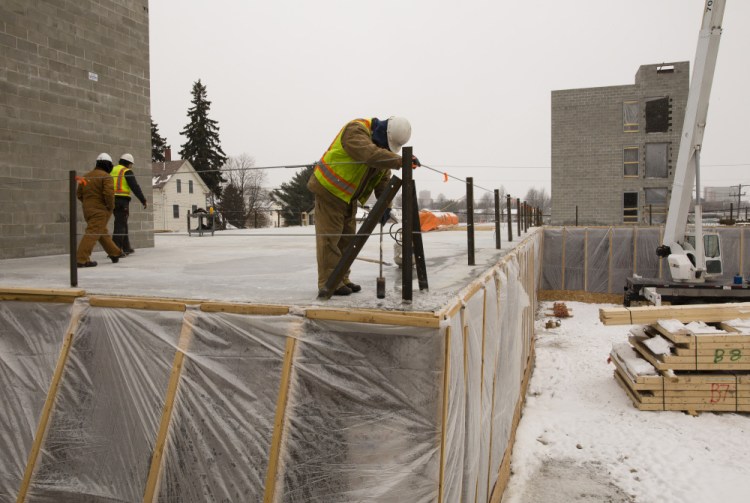The Portland City Council on Monday applauded City Manager Jon Jennings’ proposal to streamline the city’s permitting process but expressed concern about removing itself from selling properties seized because of back taxes.
The council took no action during the workshop session. Both proposals will be reviewed Thursday by the council’s Economic Development Committee.
The city staff is recommending that the city manager be allowed to sell tax-acquired properties valued at less than $400,000 and housing that consists of three units or fewer without first consulting the council. The sale price would not be less than the sum of back taxes, interest, marketing costs, attorney’s fees and other city expenses.
Retaining ownership of any property for a city use would be subject to approval by the council.
The new rules would also allow the city to sell properties that are still occupied, something it currently cannot do. The council could either sell those properties with the tenants still there, or evict the tenants.
“We’ve been struggling with this situation under the current rules,” said Greg Mitchell, the city’s economic development director.
City officials say Portland has more than 100 tax-acquired properties, valued at $12 million and representing $250,000 a year in taxes.
The new rules are designed to reduce the number of properties that go before the full council for sale.
“All we were trying to do is the council as a body knows what’s going on before it goes to the committee,” Jennings said, referring to a council subcommittee.
Councilors had several questions about removing themselves from the process, including having regular reports about properties that are sold.
Councilor Nicholas Mavodones said he was concerned that the council would take up too much time discussing what to do with properties that exceed the threshold.
“I think the committee generally can give pretty good guidance,” Mavodones said.
Councilor Jill Duson asked that the city staff consider designating revenue from the sales to provide incentives for housing.
Meanwhile, Councilor Belinda Ray wondered whether the council was delegating too much authority to the city manager.
“I love Jon, but he’s not always going to be the city manager,” she said. “I want to make sure we’re happy 10 years from now.”
PERMITTING PLAN
Councilors were generally supportive of Jennings’ proposal to create a new Permitting and Inspections Department. The additional costs would be funded through an increase in permit fees.
Jennings is asking the council to adopt the changes as an emergency measure on Wednesday of next week, meaning the changes could take effect immediately.
“When you think about the construction season, right now is when we should be thinking about this,” Jennings said.
Councilors pushed city staff members to develop a way to measure whether the changes, once implemented, are a success, because previous attempts to streamline the process do not seem to have been very effective.
The goal is to reduce the wait times for routine building permits for simple projects such as building steps. The staff estimates that 60 percent of all permit requests are small residential rehab projects, according to a memo to the council.
According to data provided by the city, the average wait time for a building permit was 42 days last year. That’s up from 35 days in 2014 and 34 days in 2013.
“I think it’s one of the most important things we can solve as a staff,” Jennings said. “There will be a lot more innovation we hope to bring before you in the coming months.”
The new office would be a one-stop shop for inspections, building permits, business licensing and zoning determinations. The city’s fledgling Housing Safety Office and food service inspections program may be folded in at a later date.
The new office would create three new positions for planning technicians, who would receive advanced training to quickly assess the completeness of permit applications, in some cases issuing a building permit on the spot and referring more complicated permits for further review. Those positions would replace a full-time and part-time office assistant and an administrative assistant.
The city would eliminate the current inspections division director and deputy director positions, in favor of an intake and review manager as well as an inspections manager.
Though the baseline fee of $25 for the first $1,000 of a project’s cost would remain unchanged, Jennings is proposing to increase a 1.1 percent surcharge for costs above $1,000 to 1.6 percent, putting it more in line with other communities.
Additional changes eyed for the long term include updating the city’s software systems to allow for more efficient filing of electronic applications. The current online application system still requires information to be entered by hand.
“This should have been done a long time ago,” Councilor Spencer Thibodeau said.
Send questions/comments to the editors.




Success. Please wait for the page to reload. If the page does not reload within 5 seconds, please refresh the page.
Enter your email and password to access comments.
Hi, to comment on stories you must . This profile is in addition to your subscription and website login.
Already have a commenting profile? .
Invalid username/password.
Please check your email to confirm and complete your registration.
Only subscribers are eligible to post comments. Please subscribe or login first for digital access. Here’s why.
Use the form below to reset your password. When you've submitted your account email, we will send an email with a reset code.